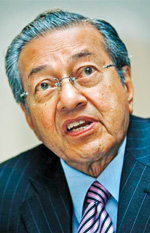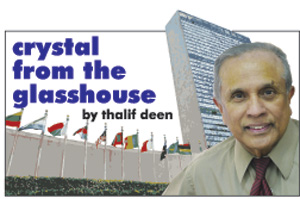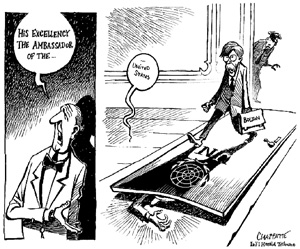Sunday Times 2
When the UN comes under heavy fire
View(s):UNITED NATIONS – When heads of government and foreign ministers make their annual pilgrimage to the United Nations in September, it is rare to hear hard-hitting, headline-grabbing political statements from the podium.

Former Malaysian Prime Minister Mahathir bin Mohamad accused the big powers of manipulating the UN to their advantage. Reuters
The speeches before the General Assembly, and the UN press briefings that follow, are mostly dull and boringly monotonous. The exceptions, however, are rare. The former Malaysian Prime Minister Mahathir bin Mohamad was one of the few world leaders who was predictably outspoken at every turn.
When the UN celebrated its 50th anniversary in 1995, virtually every single head of state visiting New York for the General Assembly sessions decided to stay behind to participate in celebrations later that week.
But Mahathir, who was known to relentlessly accuse the big powers of manipulating the organization to their advantage, decided to skip the high-level event where world leaders were allocated five minutes to speak about the political virtues and the inglorious successes of the UN – even as the world body was mired in failures in three hotspots: Bosnia, Somalia and Rwanda.
Asked why he was missing the much-ballyhooed event, Mahathir told reporters rather sarcastically: “In five minutes, you only have time to say how good things are. I am not good at saying how good things are, when things are bad.”
Mahathir, who called for the resignation of then-Secretary-General Kofi Annan for failing to assert himself during the crisis that led to the US invasion of Iraq, told the General Assembly that the UN’s organs have been “cut out, dissected and reshaped so they may perform the way the puppet masters want.”
“And this august institution in which we had pinned so much hope, despite the safeguards supposed to be provided by the permanent five (UK,US, France, China and Russia), this organization is today collapsing on its clay feet, helpless to protect the weak and the poor,” he said.
 But more than 20 years later, the political situation is no better– as the UN remains helpless unable to resolve ongoing military conflicts and domestic insurgencies raging across South Sudan, Iraq, Syria, Yemen, Palestine, Libya, Central African Republic and the Democratic Republic of Congo.
But more than 20 years later, the political situation is no better– as the UN remains helpless unable to resolve ongoing military conflicts and domestic insurgencies raging across South Sudan, Iraq, Syria, Yemen, Palestine, Libya, Central African Republic and the Democratic Republic of Congo.
The primary reason for the monumental failure is the continued deadlock in the Security Council, the UN’s most powerful body, where the five veto wielding powers are intent in protecting their own national interests and their military proxies in the battle fields in Asia, Africa and the Middle East.
Sri Lanka’s Foreign Minister, the late Lakshman Kadirgamar, was equally critical of the UN arguing that its officials and its development agencies had no legitimate right to interfere in the domestic problems of a sovereign nation. A onetime Director of the Asia and Pacific Bureau of the Geneva-based World Intellectual Property Organization (WIPO), Lakshman knew first-hand the upper and lower limits of the political and administrative structure of the UN.
When I interviewed Lakshman at the UN Plaza Hotel back in September 1999, he famously said that UN officials “should be more concerned with malaria and mosquitoes – not domestic political issues of member states.”
“With the exception of the Office of the UN High Commissioner for Refugees –involved in issues relating to humanitarian aid and refugees – other UN agencies have mandates only to be involved in social and economic development of a country,” he pointed out.

Cartoon courtesy globecartoon.com
Lakshman was furious about statements made by unnamed UN officials in Colombo expressing “deep concern” over the “extensive civilian killings in two separate incidents” in Sri Lanka at that time. The mandate of most UN agencies operating in the field is confined primarily to development, he told me. “But yet some of them are trying to expand their mandates,” he said.
Over the years, the most virulent attacks against the UN have come largely from US politicians. The late Jesse Helms, a rightwing Republican Senator from the state of North Carolina, was a consistent UN-basher. Providing funds for the UN, he said, was like pouring money into a rat hole.
Helms wanted to see the organization shipped out of New York – for good. “I have long called for our country’s departure from this organization – and vice versa,” said Helms, one of the influential legislators of his generation.
Cast in the same political mould was John Bolton, the abrasive U.S. ambassador to the United Nations who was dubbed by one New York newspaper as “a human wrecking ball.” At one time, he threatened U.N. member states, specifically the 132 developing nations, that if they don’t play ball with the United States, Washington may look elsewhere to settle international problems.
Never short of headline grabbing quotes, Bolton once admitted he did not have a cordial relationship with the UN. Perhaps he was best known for two irreconcilable statements. First, in a 1994 speech, he said that “there is no such thing as the United Nations.”
Later, he was more specific, when the politician in him, remarked: “If the UN Secretariat building in New York lost 10 stories, it wouldn’t make a difference.” And that prompted one critic to describe Bolton as more qualified to be an urban planner in charge of building construction than a cautious diplomat.
And then there was the firebrand President of Venezuela, the late Hugo Chavez, who used the General Assembly to launch an attack on then US President George W. Bush. In a rare personal attack from the podium, Chavez said: “The devil came here yesterday, right here. It still smells of sulphur today. Yesterday on this rostrum the President of the United States, whom I refer to as the devil, talked as if he owned the world.”
It would be appropriate, said Chavez, to have a psychiatrist analyse the address by the President of the United States. “As the spokesman of imperialism, he came to share his prescriptions for preserving the current pattern of domination, exploitation and pillage of the peoples of the world. It was like an Alfred Hitchcock movie. I would even propose a title: “The devil’s recipe,” said Chavez, as delegates, conscious of political decorum, remained stunned in their seats.
The writer can be contacted at thalifdeen@aol.com

